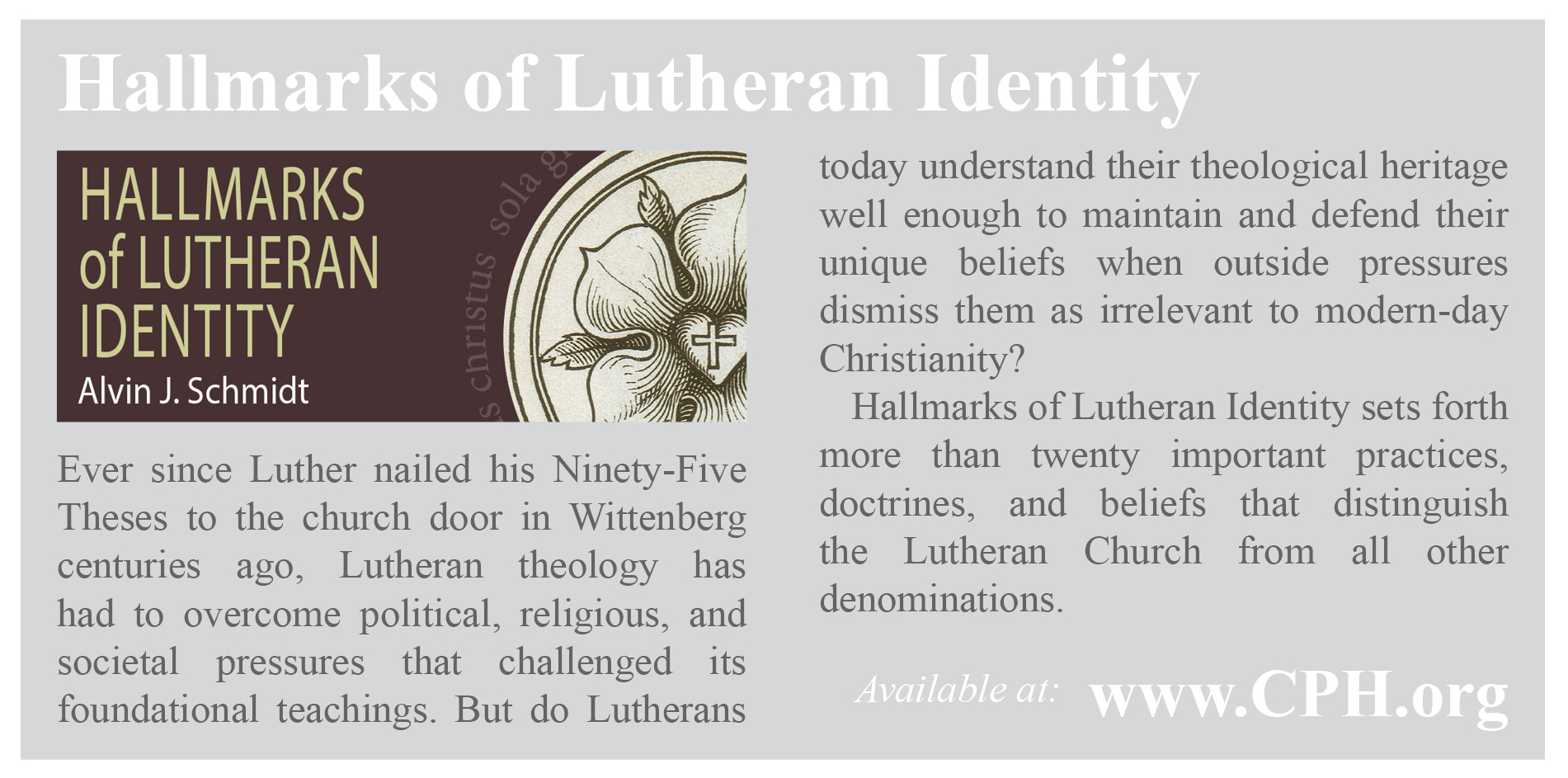
Most Lutherans have heard of the Lutheran concept of “sola Scriptura,” the Latin term Martin Luther used to assert that Christian teachings can only be based on or derived from the divinely inspired Holy Bible. But whether most Lutherans know why Luther so firmly held to this position is less obvious.
As indicated in my recent book, Hallmarks of Lutheran Identity (2017), Luther had compelling reasons why he tenaciously held to the concept of sola Scriptura. He had discovered that although some church councils—for instance, the first four ecumenical councils—rightly defended fundamental Christian teachings that preserved the gospel of Jesus Christ, some later councils often erred and even contradicted themselves. Decisions by popes were no better, for many papal proclamations and actions were riddled with false, antibiblical teachings. Thus, Luther declared, “As for the pope’s decretal on indulgences, I say that neither the Church nor pope can establish articles of faith. These must come from Scripture. For the sake of Scripture, we should reject pope and councils” [Roland H. Bainton, Here I Stand: A Life of Martin Luther (Nashville: Abingdon Press, 1950), 90].
Luther derived the doctrine of sola Scriptura from his knowing that the Holy Scriptures were the inspired words of God, written by the prophets in the Old Testament and by Christ’s hand-picked apostles in the New Testament and by two coworkers (Mark and Luke) of the apostles who wrote under the apostles’ guidance. Luther took the words Jesus spoke to his Father in his High Priestly Prayer at face value: “For I gave them [Jesus’ disciples] the words you gave me and they accepted them. They knew with certainty that I came from you, and they believed that you sent me” (John 17:8). Similarly, Luther also knew that Jesus had told his disciples, “All this I have spoken while still with you. But the Advocate, the Holy Spirit, whom the Father will send in my name, will teach you all things and will remind you of everything I have said to you” (John 14:25-26). Luke, the author of his Gospel, says the apostles were “eyewitnesses and servants of the word” (Luke 1:2). And in a similar vein, Christ (after his resurrection) told Saul (later named Paul) on his way to Damascus, “Now get up and stand on your feet. I have appeared to you to appoint you as a servant and as a witness of what you have seen and will see of me” (Acts 26:16). And Luther also knew that “all Scripture is God-breathed and is useful for teaching, rebuking, correcting and training in righteousness, so that the servant of God may be thoroughly equipped for every good work” (2 Timothy 3:16-17).
Despite these foundational words of Holy Scripture, the Bible in Luther’s day was not permitted in Christian homes. In 1233, nearly three hundred years before Luther uttered the concept of sola Scriptura, the Synod of Tarragona (in Spain) banned lay Christians from possessing any books of the Old or New Testament. And in 1407, the archbishop of London outlawed translating the Bible into English and condemned to death anyone caught reading a Wycliffe Bible. Given the withholding of the Bible from lay people, some historians say Luther did not see a Bible until about age fourteen while in school in Magdeburg; some other historians think he first saw a Bible at the University of Erlangen probably at age eighteen or nineteen.
It is not know for certain when Luther first came to see the importance of sola Scriptura. But Ernest G. Schwiebert, a Lutheran historian, thinks it was between 1508 and 1509 that sola Scriptura became a part of his theological thinking while teaching part-time at Wittenberg. Schwiebert further states, “So many pagan streams had emptied their sullied waters into the river of medieval theology, [that] no traditional interpretation of the Schoolmen, or even of the Western Fathers, was reliable” [Ernest G. Schwiebert, Luther and His Times: The Reformation from a New Perspective (St. Louis: Concordia Publishing House, 1950), 158]. Thus, Luther concluded that Scripture was the sole, reliable source and fountain of truth.
A decade later (October 1518), when Cardinal Cajetan tried to get Luther to recant in a private meeting in Augsburg, he boldly defended himself, asserting, “I teach nothing save what is in Scripture” [Bainton, op. cit., 74]. And three years later, he leaned on sola Scriptura at the Diet of Worms in 1521, when he declared, “Unless I am convinced by the testimonies of Holy Scriptures or evident reason… my conscience has been taken captive by the Word of God… God help me. Amen” [Schwiebert, op. cit., 504-505]. Then, in 1533, when Luther rejected Rome’s private masses and the consecration of priests, a practice it defended because it resembled the practice of some church fathers, he declared, “For we cannot trust or build on the lives and works of the fathers, but on God’s word alone” [Martin Luther, “The Private Mass and the Consecration of Priests,” trans. Martin E. Lehmann, Luther’s Works, eds. Martin E. Lehmann and Helmut T. Lehmann (Philadelphia: Fortress Press, 1971), 159].
Luther saw sola Scriptura as the only source and norm of Christian doctrine, as conservative Lutherans also see it today. It is also important to note that sola Scriptura serves as a means of Scripture interpreting itself. This principle essentially comes from Luther, and it is especially useful in understanding difficult passages in the Bible. Thus, Lutherans seek to understand such passages in the light of other biblical passages that are clear and unambiguous. This approach also means that the New Testament interprets the Old Testament, indicating that the Old Testament has been fulfilled in the life and deeds of Jesus Christ. As St. Augustine (d. 430) once stated, “The New is in the Old concealed, and the Old is in the New revealed.”
Conclusion:
The Lutheran Reformation is known for proclaiming solus Christus (Christ alone), sola gratia (by grace alone), and sola fide (by faith alone). Let us thank God for these biblically derived slogans, for nowhere else are these three gems of the Reformation more clearly enunciated and espoused than in the fourth gem, sola Scriptura. It is here where we are assured, “Lord, to whom shall we go? You have the words of eternal life” (John 6:68).
Dr. Alvin J. Schmidt is professor of sociology emeritus at Illinois College in Jacksonville, Illinois, and a fellow of the Society for the Scientific Study of Religion. He is the author of numerous books, including the award-winning Fraternal Organizations (1980), The Menace of Multiculturalism (1997), and How Christianity Changed the World (2004).


